萧伯纳
简述萧伯纳的戏剧艺术特点

简述萧伯纳的戏剧艺术特点
萧伯纳是英国戏剧史上具有重要影响力的杰出剧作家之一。
他的戏剧艺术特点独具一格,独辟蹊径,以幽默诙谐和社会讽刺为主要手法,深刻探讨了社会问题和人性弱点。
他的作品呈现出独特的风格,具有以下几个显著特点。
首先,萧伯纳的戏剧作品追求现实主义和史实的准确性。
他善于通过剧作展示当时社会的真实面貌,深入揭示社会阶级、性别和家庭关系等问题。
他对现实生活的细致观察使得他的作品具备了强烈的社会关怀和批判精神。
其次,萧伯纳的戏剧艺术特点之一是喜剧元素的运用。
他擅长通过幽默和讽刺的手法,戏剧化地表现人类生活的矛盾和荒谬之处。
他巧妙地运用喜剧来调侃社会观念和道德观念的偏差,展示人们之间的斗争和误解。
此外,萧伯纳的剧作常常涉及对女性地位和权益的关注。
他关注妇女地位的不平等和社会对女性的不公正待遇。
他通过塑造坚强独立的女性角色,并赋予她们具备思考力和反抗精神,向观众们传达了他对性别平等的追求与呼吁。
此外,萧伯纳的戏剧作品中常常呈现出爱情与婚姻的探讨。
他以自由恋爱为主题,探讨婚姻中的权力斗争和自由选择的重要性。
他的作品融汇了浪漫主义的情感表达和理智的分析思考,深入思考了婚姻、爱情和性别角色的复杂问题。
总之,萧伯纳的戏剧艺术特点包括追求现实主义、喜剧元素的运用、关注女性地位和权益以及对爱情和婚姻问题的深入探讨。
他的作品对社会问题提出了批判和思考,给观众带来深刻的启示和娱乐。
外国名人故事精选:萧伯纳爱素食和阳光

外国名人故事精选:萧伯纳爱素食和阳光萧伯纳是英国杰出的戏剧作家,被誉为幽默与讽刺的语言大师。
他不仅以剧作高产闻名,还因健康长寿备受关注,他高寿94岁,是世界文坛有名的寿星。
他的高产和高寿得益于强健的体魄和睿智的头脑,而这两者又和他自小养成的钟情素食、挚爱阳光的生活习惯息息相关。
萧伯纳出身贫苦,从小就养成了朴素的生活习惯。
饮食方面,萧伯纳一生喜欢素食,一日三餐多半是可可茶、黑面包、通心粉、小扁豆、鸡蛋和一定数量的生菜。
而且,萧伯纳终身禁烟忌酒,连含有刺激性的咖啡都很少饮用。
这种饮食方式,和我国传统医学倡导的“平易恬淡”的素食养生观有异曲同工之妙。
《吕氏春秋》之《重己》篇指出,善于养生的人是“不味众珍”的,因为“味众珍由胃充,胃充则大闷,大闷则气不达”。
“众珍”指的就是肉食。
现代医学也证明,日常饮食中少食油腻荤腥,多吃蔬菜、水果、粗粮等脂肪、胆固醇含量低的素食,能均衡身体营养,减少心脏病、肥胖症、高血压和癌症的发病率。
而且,谷类、豆类富含的麸酸和维生素B,是让大脑细胞活跃的主要成分。
所以,素食可以增强人的智慧和判断力,从而变得更聪明。
除了钟情素食,萧伯纳对阳光的酷爱可以说已经到了“顶礼膜拜”的地步。
英国是个多雾的国家,经常见不到阳光。
作家为了沐浴到更多的阳光,在庭院里建造了一间结构特殊的木屋,屋子底部安装了转动机关。
这样,木屋就可以随着太阳的移动而转动。
他在屋里写作、生活,就能经常接受阳光的沐浴。
有了阳光,萧伯纳就会变得思维敏捷、运动活跃,比如在阳光下游泳、划船、爬山、打网球、骑单车等等,都是萧伯纳喜爱的运动方式。
这些户外活动既缓解了写作疲劳,又锻炼了身体。
萧伯纳名言名句
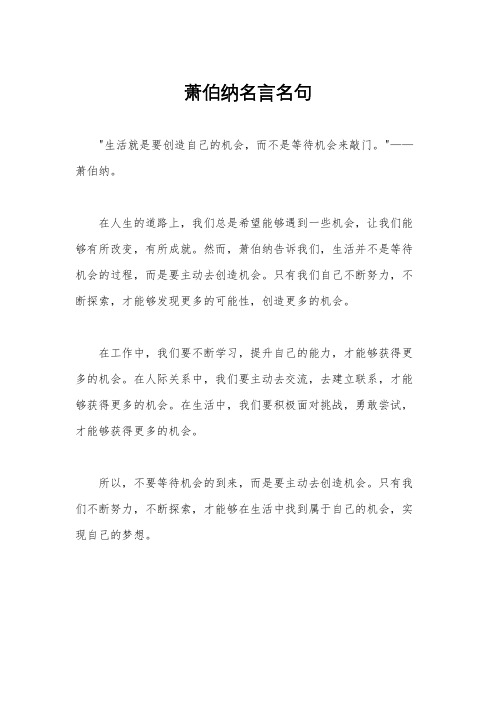
萧伯纳名言名句
"生活就是要创造自己的机会,而不是等待机会来敲门。
"——萧伯纳。
在人生的道路上,我们总是希望能够遇到一些机会,让我们能够有所改变,有所成就。
然而,萧伯纳告诉我们,生活并不是等待机会的过程,而是要主动去创造机会。
只有我们自己不断努力,不断探索,才能够发现更多的可能性,创造更多的机会。
在工作中,我们要不断学习,提升自己的能力,才能够获得更多的机会。
在人际关系中,我们要主动去交流,去建立联系,才能够获得更多的机会。
在生活中,我们要积极面对挑战,勇敢尝试,才能够获得更多的机会。
所以,不要等待机会的到来,而是要主动去创造机会。
只有我们不断努力,不断探索,才能够在生活中找到属于自己的机会,实现自己的梦想。
萧伯纳故事5篇

萧伯纳故事5篇以下是网友分享的关于萧伯纳故事的资料5篇,希望对您有所帮助,就爱阅读感谢您的支持。
萧伯纳故事篇11、收敛锋芒韬光养晦据说大文豪萧伯纳从小就很聪明.而且言语幽默.在他年轻时特别喜欢展露锋芒.说话也尖酸刻薄.谁要是被他说一句话.便会有体无完肤之感.有一次一位老朋友私下对他说.这个小故事告诉我们.与人交往时总是2、刻苦创作登上文坛1879年,英国作家萧伯纳写成了第一部长篇小说《未成年时期》,但自己感觉不满意,马上又在这篇小说的稿纸背面动手写第二部。
对这篇作品书商却不屑一顾,但萧伯纳毫不气馁,又连续写了第三部。
那时,萧伯纳靠着不固定的微薄的收入维持生活,一面在图书馆自修,一面刻苦进行文学创作。
直到1884年,有两家杂志发表了他的第五部长篇小说《业余社会主义者》,这才开始引起众人注意,让作者正式登上了文坛。
萧伯纳对待写作不畏挫折,在连遭四次失败后,第五部小说才得以公开发表,开始步入文坛。
人要想事业最终成功,必须具备顽强的抗挫折素质,不要怕失败,失败了可以重来,不断总结经验教训,不断奋起,不断进击,否则只会半途而废。
3、假痴不癫幽默高傲在一个慈善舞会上,萧伯纳邀请一位女士共舞。
这位女士非常高傲轻佻,虽然拒绝别人的邀请,但是面对大名鼎鼎的萧伯纳的邀请,她接受了,只是,她依然一副唯我独尊的态度,好像她是给萧伯纳面子一样。
在华尔兹乐曲声中,这位女士得意地问:“萧伯纳先生,你怎么会想到邀请我跳舞,是不是倾慕我的高贵和美貌呢?”萧伯纳故事惊讶地回答说:“您怎么会这样想呢!完全不是这么回事。
”女士奇怪地问:“那究竟是为什么呢?”萧伯纳有意一本正经地回答:“哦,女士,莫非您真的如此健忘?今天这个舞会不是个慈善舞会吗?”女士愣了一下,很快面露尴尬之色。
萧伯纳故事篇2无一不晓有一天,萧伯纳应邀参加了一个丰盛的晚宴。
席间有一青年在大文豪面前滔滔不绝地吹嘘自己的天才,好像自己天南海北样样通晓,大有不可一世的气概。
起初,萧伯纳缄口不言,洗耳恭听。
萧伯纳名言名句

萧伯纳名言名句
“成功的秘诀在于不断前进。
”——萧伯纳。
在人生的道路上,我们常常会遇到挫折和困难,但是成功的秘
诀在于不断前进。
萧伯纳先生的这句名言告诉我们,只有不断努力,不断进取,才能最终取得成功。
在追求梦想的道路上,我们可能会遭遇失败和挫折,但是只要
不气馁,不放弃,坚持不懈地向前走,最终一定会迎来成功的曙光。
正如萧伯纳所说,成功并不是一蹴而就的,而是需要付出持续不断
的努力和奋斗。
在面对困难时,我们要坚信自己的能力,相信只要不停地努力,就一定能够克服一切困难,实现自己的目标。
因为只有不停地前进,才能走向成功的彼岸。
所以,让我们牢记萧伯纳的这句名言,不断前进,勇往直前,
相信自己,坚持不懈,最终一定会收获成功的果实。
关于萧伯纳的幽默故事
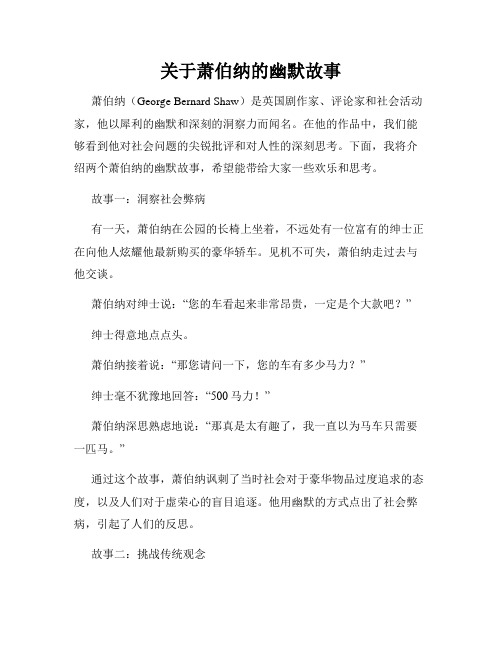
关于萧伯纳的幽默故事萧伯纳(George Bernard Shaw)是英国剧作家、评论家和社会活动家,他以犀利的幽默和深刻的洞察力而闻名。
在他的作品中,我们能够看到他对社会问题的尖锐批评和对人性的深刻思考。
下面,我将介绍两个萧伯纳的幽默故事,希望能带给大家一些欢乐和思考。
故事一:洞察社会弊病有一天,萧伯纳在公园的长椅上坐着,不远处有一位富有的绅士正在向他人炫耀他最新购买的豪华轿车。
见机不可失,萧伯纳走过去与他交谈。
萧伯纳对绅士说:“您的车看起来非常昂贵,一定是个大款吧?”绅士得意地点点头。
萧伯纳接着说:“那您请问一下,您的车有多少马力?”绅士毫不犹豫地回答:“500马力!”萧伯纳深思熟虑地说:“那真是太有趣了,我一直以为马车只需要一匹马。
”通过这个故事,萧伯纳讽刺了当时社会对于豪华物品过度追求的态度,以及人们对于虚荣心的盲目追逐。
他用幽默的方式点出了社会弊病,引起了人们的反思。
故事二:挑战传统观念萧伯纳曾被邀请参加一个晚宴,在那里,他面对着一位自命不凡的女性。
女士自豪地用著名画家的名字自称:“我是卡拉瓦乔(Caravaggio)的重生。
”萧伯纳不动声色地回答:“那太好了,卡拉瓦乔一直是我最敬佩的画家之一。
”女士听后大为震惊:“你真的见过卡拉瓦乔?”萧伯纳平静地笑着说:“当然见过,上周他还在我的画廊展出。
”这个故事展现了萧伯纳对于传统观念的挑战。
他以平和的态度与女士对话,同时又以幽默的方式暗示她的自负和虚伪。
通过这个故事,萧伯纳以独到的眼光观察人性,并用幽默戳破了人们对自身的高估和虚假自大。
萧伯纳的幽默故事带给了读者欢乐和思考。
他通过文字中的幽默和调侃,突破常规的思维模式,揭示了人们日常生活中的喜剧和悲剧。
他的作品也深受人们喜爱和赞赏,对于社会的发展和人性的思考有着重要的意义。
总结:通过以上两个萧伯纳的幽默故事,我们可以看到他在作品中运用幽默的方式,对当时社会问题和人性进行了深刻的思考和批评。
他通过幽默的手法,让人们在欢笑中思考,从而唤起对社会弊病的关注和改变。
萧伯纳
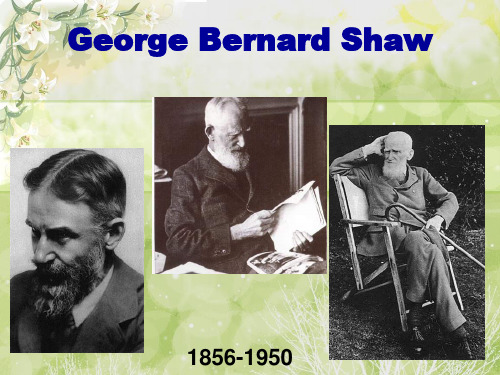
《华伦夫人的职业》
《华伦夫人的职业》(1894年)取材于 现实生活。出身贫苦,在操了皮肉生涯之 后,由于经营有道,发展成为欧洲多个大 妓院的老板。为了不让女儿薇薇重蹈覆辙 ,她以嫖资供女儿接受高等教育。当薇薇 最终了解到母亲的苦难经历后,她谅解了 母亲的过去,但还是在经济上和母亲决裂 ,决心依靠自己的劳动独立生活。本剧描 述了主人公人生哲学的形成和性格发展的 全过程。
《皮格马利翁》
《皮格马利翁》(1912年)是剧作家的一 部最著名的喜剧作品。在此之前,作者已经创 作并上演了二十八个剧本,虽然在戏剧界引起 了广泛的重视,但却没有在观众中广为流行。 直到这部喜剧上演,并被拍成电影、上了广播 ,他才真正作为喜剧大师赢得了观众的普遍接 受与欢迎。“匹克梅梁”即希腊神话中塞浦路 斯王皮格马利翁,善雕刻,一次他雕刻了一个 少女像,并且爱恋上了这个雕像,爱神受到感 动,便给了雕像以生命,使他们二人结为夫妇 。剧作家借用这个名字和典故以表示剧中语音 学家息金斯和卖花女伊莉莎的关系。
这个曾饱受苦难的原本正直的女人,目 睹无数从事诚实劳动的妇女濒于死亡或过 着牛马不如的生活,便对正直而遭受苦难 是否值得产生了怀疑。她的职业虽然卑鄙 下贱,但却给她带来了财富和体面,因而 她从不想放弃这种职业。她认为除了罪恶 的行当外,没有别的什么可干,她要靠它 发财,她要遵循这个世界的规律并从中取 利。剧作者以主人公的尖锐台词透视出当 代社会中人与人之间真正关系的内幕。
Major Works
• Widowers' Houses (1892) 《鳏夫的房产》 • Mrs. Warren‘s Profession (1894)《华伦夫人的职业》 Caesar and Cleopatra (1898)《凯萨与克丽奥佩拉 》 Man and Superman (1903)《人与超人》 Major Barbara (1905) 《巴巴拉少校》 Pygmalion (1912) 《卖花女》 Heartbreak House (1917) 《伤心之家》 Saint Joan (1923) 《圣女贞德》 The Apple Cart (1929) 《苹果车》
萧伯纳

●《鳏夫的房产》(Widowers' Houses) ●《圣女贞德》(Saint Joan) ●《卖花女》(Pygmalion) ●《魔鬼的门徒》(The Devil's Disciple) ●《人与超人》(Man and Superman) ●《伤心之家》(Heartbreak House) ●《华伦夫人的职业》(Mrs Warren's Profession) ●《医生的两难选择》(The Doctor's Dilemma)
• 劳动是惟一导向知识的道路。 • 学得越多,知道得越多。知道得越多,忘得越多。 忘得越多,知道得越少。那么何必学呢? • 自我控制是最强者的本能。
一次萧伯纳在街上行走,被一个冒失鬼骑车 撞倒在地,幸好没有受伤,只虚惊一场。骑车人 急忙扶起他,连连道歉,可是萧伯纳却作出惋惜 的样子说:‚你的运气不好,先生,你如果把我 撞死了,你就可以名扬四海了!‛
萧伯纳(1856~1950),英国现代杰出的现实主义 戏剧作家,世界著名的擅长幽默与讽刺的语言大师。他 出生于爱尔兰一个中等家庭,从小就喜爱文学。萧伯纳 的戏剧最突出的特点是紧密结合现实的政治斗争,敢于 触及资本主义社会最本质的问题,把剥削阶级的丑恶嘴 脸赤裸裸地暴露在公众面前。在艺术手法上,他善于通 过人物对话和思想感情交锋来表现戏剧冲突和丰题思想。 萧伯纳的戏剧语言尖锐泼辣,充满机智,妙言警语脱口 而出。
一天,瘦削的萧伯纳碰到一位大腹便便的商 人,商人讥讽道:‚看见你,人们会以为英国发 生了饥荒!‛ 萧伯纳回击道:‚看见你,人们就会明白饥 荒的原因。‛
ห้องสมุดไป่ตู้
一个记者问萧伯纳‚乐观主义者与悲观主义 者‛的区别时,萧伯纳回答:‚假如在桌子上有 半瓶酒,看到这瓶酒而高喊:‘太好了,还有一 半!’这样的人就是乐观主义者;如果叹息酒仅 剩下一半,那就是悲观主义者。‛
诺贝尔与萧伯纳

萧伯纳的一生,是和社会主义运动发生密切 关系的一生。其思想深受德国哲学家叔本华 及尼采的影响,也读过读过马克思与恩格斯 合著的《资本论》,与鲁迅、高尔基是挚友。
历史背景
贞德是法国一个农村牧羊姑娘,生活在英法百年战争期间。当
时,法国半壁河被英国军队侵占,濒临亡国的危险。贞德,为强 烈的爱国热情所激励,自称奉上天之命拯救法国。她冲破重重障 碍,面见法国太子,被委以军队指挥之权。战斗中她身先士卒, 鼓舞斗志,一战而解奥尔良之围,军心大振。在她率领下,短短 数月,连克重镇,大挫英国侵略军的锐气,挽救了法国危亡的局 势。接着,贞德扶持法国太子在里姆斯大教堂加冕登基,是为法 国国王查理七世。巩固了法国的国家主权。在胜利的形势下,本 可一举攻克被英军占领的巴黎。但在此关键时刻,法国封建统治 者嫉贤妒能,对贞德排斥阻挠。她在支援康边时作战失利,为内 奸所俘,由英军以重金买去,交给宗教裁判所,诬以犯有“异端、 巫术、妖法之罪”,将她烧死在卢昂广场。
⑥也许,科学家的重要性并不在于是否获奖,而在于是否为造福人类而献身。懂得了这一点,中 国人就离诺贝尔奖近了一步。
1、根据第①节内容,指出中国人的“诺贝尔情结”的具体含义。
中国人对诺贝尔奖的渴望和总得不到诺贝尔奖的困惑。
2、结合原文,说说你对“历史似乎总是充满戏剧性”这句话的理解。
面对诺贝尔奖的桂冠,求者不得,得者不求。
西方科学家?中国人离诺贝尔奖有多远?中国人为什么拿不了诺贝尔奖?在中国人的心底,似乎隐 藏着一种挥之不去的“诺贝尔情结”。
②客观地说,诺贝尔奖并不能完全反映一个国家的科学研究水平,但是,诺贝尔奖又是一个独特
萧伯纳语录
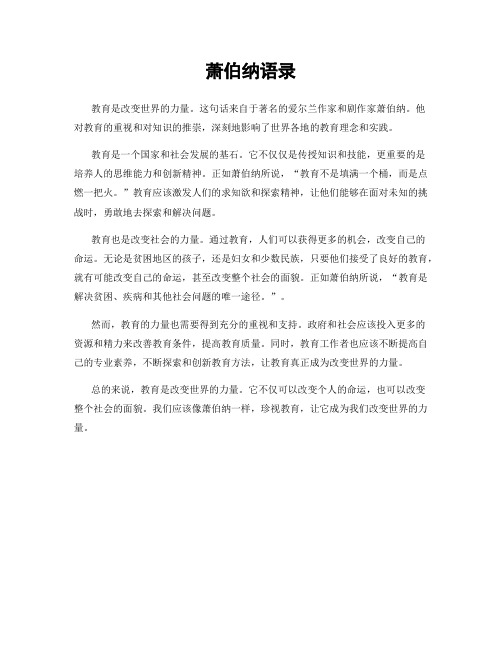
萧伯纳语录
教育是改变世界的力量。
这句话来自于著名的爱尔兰作家和剧作家萧伯纳。
他
对教育的重视和对知识的推崇,深刻地影响了世界各地的教育理念和实践。
教育是一个国家和社会发展的基石。
它不仅仅是传授知识和技能,更重要的是
培养人的思维能力和创新精神。
正如萧伯纳所说,“教育不是填满一个桶,而是点燃一把火。
”教育应该激发人们的求知欲和探索精神,让他们能够在面对未知的挑战时,勇敢地去探索和解决问题。
教育也是改变社会的力量。
通过教育,人们可以获得更多的机会,改变自己的
命运。
无论是贫困地区的孩子,还是妇女和少数民族,只要他们接受了良好的教育,就有可能改变自己的命运,甚至改变整个社会的面貌。
正如萧伯纳所说,“教育是解决贫困、疾病和其他社会问题的唯一途径。
”。
然而,教育的力量也需要得到充分的重视和支持。
政府和社会应该投入更多的
资源和精力来改善教育条件,提高教育质量。
同时,教育工作者也应该不断提高自己的专业素养,不断探索和创新教育方法,让教育真正成为改变世界的力量。
总的来说,教育是改变世界的力量。
它不仅可以改变个人的命运,也可以改变
整个社会的面貌。
我们应该像萧伯纳一样,珍视教育,让它成为我们改变世界的力量。
萧伯纳
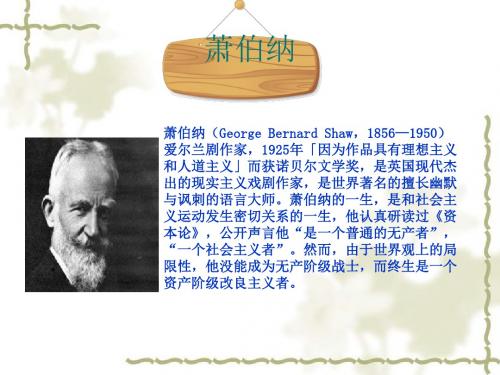
●《鳏夫的房产》(Widowers' Houses)
●《圣女贞德》(Saint Joan)
●历史剧 《卖花女》(Pygmalion)
(1964年改编成电影《窈窕淑女》,当年获奥斯卡最佳影片、最佳导 演、最 佳改编音乐等八座小金人。)
●《魔鬼的门徒》(The Devil's Diቤተ መጻሕፍቲ ባይዱciple)
●《人与超人》(Man and Superman)
●《伤心之家》(Heartbreak House)
●《华伦夫人的职业》(Mrs Warren's Profession)
●《巴巴拉少校》(Major Barbara)
●《苹果车》(The Apple Cart)
●《医生的两难选择》(The Doctor's Dilemma)
戏剧特点
萧伯纳的戏剧最突出的特点是紧密结合现实政治斗争,敢于 触及资本主义社会最本质的问题,把剥削阶级的丑恶嘴脸暴 露在公众面前。在艺术手法上,他善于通过人物对话和思想 感情交锋来表现性格冲突和主思想。萧伯纳的戏剧性语言尖 锐泼辣,充满机智,妙语警名脱口而出。他的最著名的剧作 有:《鳏夫的房产》、《华伦夫人的职业》、《武器与人》、
《真相毕露》等。其喜剧作品《卖花女》(Pygmalion)因 被 Alan Lerner 改编为音乐剧《窈窕淑女》(My Fair Lady),该音乐剧又被好莱坞改编为同名卖座电影而家喻户
晓。 三十年代初,萧伯纳访问苏联和中国,与高尔基,鲁 迅结下诚挚友谊。
主要作品
●《卡希尔·拜伦的职业》(Cashel Byron's Profession )
萧伯纳的故事

萧伯纳的故事爱尔兰剧作家萧伯纳(George Bernard Shaw)是20世纪最伟大的戏剧家之一,他的作品《皮格马利翁》、《凤凰男》等在世界戏剧史上留下了不朽的篇章。
他的一生跌宕起伏,充满了传奇色彩。
萧伯纳出生于一个贫穷的爱尔兰家庭,他的童年并不幸福。
父亲是一位小学教师,家境拮据。
但正是在这样的环境下,萧伯纳磨练出了坚韧不拔的性格和不屈不挠的毅力。
他从小就展现出非凡的才华,擅长文学和音乐,尤其对戏剧产生了浓厚的兴趣。
年轻的萧伯纳离开了家乡,前往伦敦追寻自己的梦想。
在伦敦,他经历了一段艰苦的时期,为了生计,他做过文书、校对、评论和写作等工作。
但无论做什么工作,他都不忘对戏剧的执着追求。
他在自学的过程中,广泛涉猎了文学、哲学、经济学等各个领域的知识,这些知识的积累为他后来的创作打下了坚实的基础。
萧伯纳的第一部戏剧作品是《皮格马利翁》,这部作品一经问世,便引起了轰动。
它不仅在英国引起了巨大的反响,也在国际上获得了极高的评价。
《皮格马利翁》以其深刻的思想和优美的语言征服了观众,使萧伯纳一举成名。
此后,他又相继创作了《凤凰男》、《圣女贞德》等一系列杰出的作品,为世人所津津乐道。
除了戏剧创作,萧伯纳还是一位杰出的文论家和社会活动家。
他的《英国各阶级的特征》、《社会主义者的信仰》等著作,揭露了当时社会的种种弊病,引起了社会的广泛关注。
他积极参与了社会改革运动,为废除奴隶制度、争取妇女权利等事业倾注了心血。
萧伯纳一生坚持着自己的理想和信念,他的作品充满了对社会现实的批判和对人性的关怀。
他的作品不仅具有很高的艺术价值,更蕴含着深刻的思想内涵,对当代社会仍具有重要的启示意义。
总的来说,萧伯纳是一位伟大的戏剧家,他的一生充满了传奇色彩。
他的作品不仅在戏剧史上留下了不朽的篇章,也为后人树立了崇高的精神典范。
他的故事激励着我们,让我们更加坚定地追求自己的梦想,为社会的进步贡献自己的力量。
关于萧伯纳的幽默故事

关于萧伯纳的幽默故事萧伯纳(George Bernard Shaw)是英国著名剧作家、评论家和社会活动家,他以其尖锐幽默的文字风格而闻名于世。
在他的作品中,常常通过幽默的手法来批判社会不公和现实问题。
下面将为您介绍几个萧伯纳的幽默故事。
故事一:《自由女神与女佣的对话》在这个故事中,萧伯纳以幽默的方式探讨了社会阶级和权力的问题。
故事发生在纽约自由女神像上。
自由女神和一个女佣在对话,女佣问自由女神:“你为什么站在那里?”自由女神回答:“我在这里代表自由和正义。
”女佣笑了起来,“噢,那么你是一个女佣吗?”自由女神困惑地问:“为什么你这么说?”女佣耸了耸肩膀:“因为你站在那么高的地方,就好像在挖掘可能会破坏地盘的煤矿一样。
”故事二:《桫椤树下的约会》这个故事讲述了一个年轻女子与她的婚姻介绍人在一棵桫椤树下的对话。
女子向介绍人抱怨说自己的丈夫很沉闷,没有幽默感。
介绍人回应道:“我的天!您想要什么样的丈夫呢?”女子发送遐想,回答道:“我希望他毫无幽默感,这样我可以独享所有的笑声。
”故事三:《伊凡诺夫的金子》这个故事揭示了人们贪婪和追求金钱的一面。
伊凡诺夫是个酒保,他梦见了藏有金子的地方。
醒来后,他迫不及待地去找到金子。
他花费了整个下午,拼命挖掘地面,在他疲惫不堪时,终于发现了一颗巨大的土豆。
他欣喜若狂地将土豆塞入口袋,并说:“哇!我找到宝藏了!”然后转身回家,满怀欣喜地准备煮熟这颗“金子”。
故事四:《权力的戏剧》这个故事讽刺了政治家和权力的虚伪。
在一个权力游戏盛行的国度,政治家常常做一些虚伪的事情来迎合选民。
每当政治家上任宣誓时,总有一个小人物在一旁大声吹起口哨。
政治家宣誓后,这个小人物会立即喝掉一杯加糖的水,并建议政治家也喝一杯。
政治家虚情假意地接过水杯,喝下一口,然后说:“看!我早就知道这杯水里有毒!”这些幽默故事展示了萧伯纳对人性和社会问题的独特见解,他以幽默的方式揭示了社会弊端和人们的虚伪之处。
通过这些故事,我们可以思考和反思当代社会中的一些现象,以及我们自己是否也可以运用幽默的力量来照亮生活中的困境。
萧伯纳的故事

萧伯纳的故事萧伯纳(George Bernard Shaw)是一位著名的爱尔兰剧作家和文学家,被誉为20世纪英国文学的重要人物之一。
萧伯纳于1856年出生在都柏林的一个中产阶级家庭,年轻时曾是一位音乐评论员和剧院评论员。
他的第一部剧作《胡安——你来自哪里?》于1893年发表,引起了轰动。
此后他又相继出版了许多重要的剧作,如《成为最高统治者》、《圣女贞德》和《皆大欢喜》等。
萧伯纳的剧作大多涵盖社会问题和政治问题,以及对人性和道德的深刻探讨,深受广大读者和观众的喜爱。
萧伯纳不仅是一位出色的剧作家,还是一位积极的社会活动家和政治家。
他关注贫穷、教育和女权等社会问题,在政治上则支持社会主义和左翼思想,曾经加入英国社会党。
他还借助自己的影响力,在二战期间募集了大量的捐款,用于支援战争的难民和战斗的士兵。
萧伯纳的一生充满了传奇色彩,他是一位充满激情和智慧的人。
他不仅是一位伟大的文学家,更是一个伟大的人格。
他的故事激励着人们追求真理和正义,为了自己的信仰和理想而不断奋斗。
在他的作品中,萧伯纳通常会带着讽刺和挖苦的口吻揭示社会的黑暗面和人性的弱点,打破现实的假象,勇敢地挑战社会权力和传统观念。
他的剧作常常充满了幽默和反讽,挑战了观众对生活的认知和理解。
萧伯纳早年积极参与文学界和剧院界的工作,他在评论古典音乐方面颇有造诣,曾经写过许多音乐评论,而这也是他日后创作音乐剧的基础。
他的剧作也被广泛地演出,并得到了许多的赞誉和奖项。
他所创作的剧作一直受到读者和观众的热爱和追捧,被视为现代戏剧史上的经典之作。
在萧伯纳的后期,他也参与了政治和社会的活动,曾经担任伦敦市议会的成员和英国社会党的领导人。
他一直致力于改善社会的不公和不平等,为穷苦人民和弱势群体的权益而奋斗。
他的思想理念深深地影响了20世纪的英国文化和社会。
萧伯纳虽已离开人世多年,但他的作品和思想依然在人们心中生生不息。
他是英国文学史上的巨人,也是世界文学史上的瑰宝,他的故事将一直流传下去,激励着人们追求美好和幸福的生活。
萧伯纳的故事

背景萧伯纳(George Bernard Shaw,1856年7月26日~1950年11月2日),直译为乔治·伯纳·萧,爱尔兰剧作家,1925年「因为作品具有理想主义和人道主义」而获诺贝尔文学奖,是英国现代杰出的现实主义戏剧作家,是世界著名的擅长幽默与讽刺的语言大师。
萧伯纳的一生,是和社会主义运动发生密切关系的一生,他认真研读过《资本论》,公开声言他“是一个普通的无产者”,“一个社会主义者”。
然而,由于世界观上的局限性,他没能成为无产阶级战士,而终生是一个资产阶级改良主义者。
萧伯纳1856年7月26日,出生于爱尔兰的首都都伯林(注释:他出生的时候爱尔兰还是英国的一部分,故有些资料分类他的国籍为英国)的一个小公务员家里。
他的父亲是个没落贵族,母亲出身于高贵的乡绅世家,从小受过严格的上等教育。
著名作家萧伯纳的童年、青年时代是很不幸的。
他的父亲不仅形象极丑,而且是个谁都不喜欢的懒惰者,多半是整天醉醺醺的,老婆孩子的事情一概不管。
萧伯纳年幼时,研究音乐理论的万达里尔李与他们合租了一幢房子。
受这位研究音乐的邻居影响,萧伯纳迷恋上了音乐,13岁时,他就能用口哨吹出许多优秀歌剧的片段,由于家里太穷,15岁的萧伯纳不得不辍学。
为了维持生活,他进入都柏林的汤森地产公司当学徒。
1876年,他的父母离婚。
萧伯纳告别了年迈的父亲,离开了贫困的故土爱尔兰,随母亲来到伦敦。
年轻的萧伯纳没有工作,靠母亲微薄的薪水维持生活,十分渴望找到一份称心的职业,他先在爱迪生电话公司外务部找到一份差事,可是不久这家公司倒闭了,别人给他介绍到《大黄蜂》报撰写音乐评论,可不久这份报刊也停刊了。
万般无奈的萧伯纳想以写作谋生,但是他并不顺利,他接着写了5部长篇小说,全部被60家出版社拒绝,这令他更加沮丧。
在长达九年的时间里所得的稿酬不过6英镑,其中5英镑还是代写卖药广告的报酬。
1876~1898年在伦敦从事新闻工作,在《明星报》、《星期六评论》上写了很多关于音乐和戏剧的评论文章。
萧伯纳名言名句

萧伯纳名言名句
“生活就是要不断地改变和适应。
”——萧伯纳。
生活就像一场永不停息的旅程,充满了变化和挑战。
萧伯纳先
生告诉我们,面对生活中的种种变化,我们需要不断地改变和适应。
只有积极面对变化,才能更好地适应生活的各种挑战,才能更好地
成长和进步。
在工作中,我们常常会面临着各种变化,可能是新的工作任务、新的领导或是新的团队成员。
而在生活中,我们也会面对各种变化,可能是家庭的变故、朋友的离去或是自己的身体健康。
面对这些变化,我们不能因为害怕或不适应而束手束脚,而是要积极地去适应
和改变自己,寻找新的解决方案和应对策略。
只有不断地改变和适应,我们才能在变化中保持稳定,保持前进的动力。
萧伯纳先生的这句名言告诉我们,生活中的变化是不可避免的,我们需要学会接受和适应它们。
只有不断地改变和适应,我们才能
在生活的旅程中走得更远,走得更好。
让我们牢记这句名言,勇敢
地面对生活中的变化,努力不断地改变和适应,让自己变得更加强
大和坚韧。
萧伯纳简介(中英文)
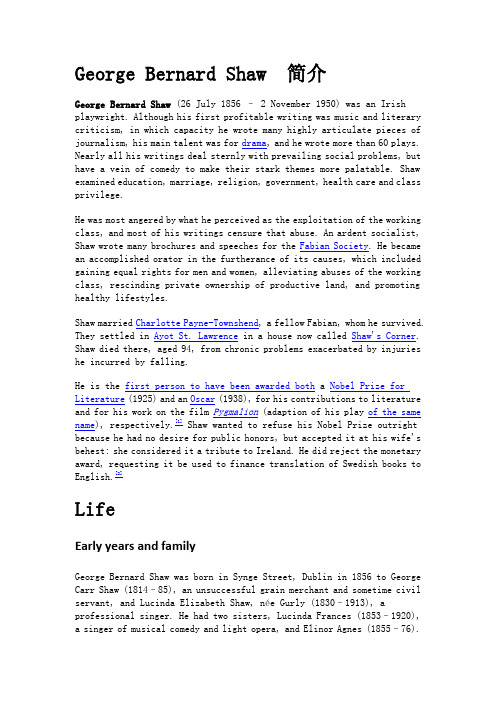
George Bernard Shaw 简介George Bernard Shaw (26 July 1856 – 2 November 1950) was an Irish playwright. Although his first profitable writing was music and literary criticism, in which capacity he wrote many highly articulate pieces of journalism, his main talent was for drama, and he wrote more than 60 plays. Nearly all his writings deal sternly with prevailing social problems, but have a vein of comedy to make their stark themes more palatable. Shaw examined education, marriage, religion, government, health care and class privilege.He was most angered by what he perceived as the exploitation of the working class, and most of his writings censure that abuse. An ardent socialist, Shaw wrote many brochures and speeches for the Fabian Society. He became an accomplished orator in the furtherance of its causes, which included gaining equal rights for men and women, alleviating abuses of the working class, rescinding private ownership of productive land, and promoting healthy lifestyles.Shaw married Charlotte Payne-Townshend, a fellow Fabian, whom he survived. They settled in Ayot St. Lawrence in a house now called Shaw's Corner. Shaw died there, aged 94, from chronic problems exacerbated by injuries he incurred by falling.He is the first person to have been awarded both a Nobel Prize for Literature(1925) and an Oscar(1938), for his contributions to literature and for his work on the film Pygmalion (adaption of his play of the same name), respectively.[1] Shaw wanted to refuse his Nobel Prize outright because he had no desire for public honors, but accepted it at his wife's behest: she considered it a tribute to Ireland. He did reject the monetary award, requesting it be used to finance translation of Swedish books to English.[2]LifeEarly years and familyGeorge Bernard Shaw was born in Synge Street, Dublin in 1856 to George Carr Shaw (1814–85), an unsuccessful grain merchant and sometime civil servant, and Lucinda Elizabeth Shaw, née Gurly (1830–1913), a professional singer. He had two sisters, Lucinda Frances (1853–1920), a singer of musical comedy and light opera, and Elinor Agnes (1855–76).[edit] EducationShaw briefly attended the Wesleyan Connexional School, a grammar school operated by the Methodist New Connexion, before moving to a private school near Dalkey and then transferring to Dublin's Central Model School. He ended his formal education at the Dublin English Scientific and Commercial Day School. He harbored a lifelong animosity toward schools and teachers, saying: "Schools and schoolmasters, as we have them today, are not popular as places of education and teachers, but rather prisons and turnkeys in which children are kept to prevent them disturbing and chaperoning their parents".[3]In the astringent prologue to Cashel Byron's Profession young Byron's educational experience is a fictionalized description of Shaw's own schooldays. Later, he painstakingly detailed the reasons for his aversion to formal education in his Treatise on Parents and Children.[4] In brief, he considered the standardized curricula useless, deadening to the spirit and stifling to the intellect. He particularly deplored the use of corporal punishment, which was prevalent in his time.When his mother left home and followed her voice teacher, George Vandeleur Lee, to London, Shaw was almost sixteen years old. His sisters accompanied their mother[5] but Shaw remained in Dublin with his father, first as a reluctant pupil, then as a clerk in an estate office. He worked efficiently, albeit discontentedly, for several years.[6] In 1876, Shaw joined his mother's London household. She, Vandeleur Lee, and his sister Lucy, provided him with a pound a week while he frequented public libraries and the British Museum reading room where he studied earnestly and began writing novels. He earned his allowance by ghostwriting Vandeleur Lee's music column,[7][8] which appeared in the London Hornet. His novels were rejected, however, so his literary earnings remained negligible until 1885, when he became self-supporting as a critic of the arts.[edit] Personal life and political activismThe front of Shaw's Corner as it stands todayInfluenced by his reading, he became a dedicated Socialist and a charter member of the Fabian Society,[9] a middle class organization established in 1884 to promote the gradual spread of socialism by peaceful means.[6] In the course of his political activities he met Charlotte Payne-Townshend, an Irish heiress and fellow Fabian; they married in 1898. In 1906 the Shaws moved into a house, now called Shaw's Corner, in Ayot St. Lawrence, a small village in Hertfordshire; it was to be their home for the remainder of their lives, although they also maintained a residence at 29 Fitzroy Square in London.Shaw's plays were first performed in the 1890s. By the end of the decade he was an established playwright. He wrote sixty-three plays and his output as novelist, critic, pamphleteer, essayist and private correspondent was prodigious. He is known to have written more than 250,000 letters.[10]Along with Fabian Society members Sidney and Beatrice Webb and Graham Wallas, Shaw founded the London School of Economics and Political Science in 1895 with funding provided by private philanthropy, including a bequest of £20,000 from Henry Hunt Hutchinson to the Fabian Society. One of the libraries at the LSE is named in Shaw's honor; it contains collections of his papers and photographs.[11][edit] Final yearsDuring his latter years, Shaw enjoyed attending to the grounds at Shaw's Corner. He died at the age of 94, of renal failure precipitated by injuries incurred by falling while pruning a tree.[12] His ashes, mixed with those of his wife, Charlotte Payne-Townshend, were scattered along footpaths and around the statue of Saint Joan in their garden.[13][edit] Career[edit] WritingsThe International Shaw Society provides a detailed chronological listing of Shaw's writings.[14]See also George Bernard Shaw, Unity Theatre.[15]View Shaw's Works for listings of his novels and plays, with links to their electronic texts, if those exist.[edit] CriticismShaw became a critic of the arts when, sponsored by William Archer, he joined the reviewing staff of the Pall Mall Gazette in 1885.[16] There he wrote under the pseudonym "Corno di Bassetto" ("basset horn")—chosen because it sounded European and nobody knew what a corno di bassetto was. In a miscellany of other periodicals, including Dramatic Review (1885–86), Our Corner (1885–86), and the Pall Mall Gazette (1885–88) his byline was "GBS".[17] From 1895 to 1898, Shaw was the drama critic for Frank Harris' Saturday Review, in which position he campaigned brilliantly to displace the artificialities and hypocrisies of the Victorian stage with a theater of actuality and thought. His earnings as a critic made him self-supporting as an author and his articles for the Saturday Review made his name well-known.He had a very high regard for both Irish stage actor Barry Sullivan's and Johnston Forbes-Robertson's Hamlets, but despised John Barrymore's. Barrymore invited him to see a performance of his celebrated Hamlet, and Shaw graciously accepted, but wrote Barrymore a withering letter in which he all but tore the performance to shreds. Even worse, Shaw had seen the play in the company of Barrymore's then wife, but did not dare voice his true feelings about the performance aloud to her.[18]Much of Shaw's music criticism, ranging from short comments to the book-length essay The Perfect Wagnerite, extols the work of the German composer Richard Wagner.[19]Wagner worked 25 years composing Der Ring des Nibelungen, a massive four-part musical dramatization drawn from the Teutonic mythology of gods, giants, dwarves and Rhine maidens; Shaw considered it a work of genius and reviewed it in detail. Beyond the music, he saw it as an allegory of social evolution where workers, driven by "the invisible whip of hunger", seek freedom from their wealthy masters. Wagner did have socialistic sympathies, as Shaw carefully points out, but made no such claim about his opus. Conversely, Shaw disparaged Brahms, deriding A German Requiem by saying "it could only have come from the establishment of a first-class undertaker".[20] Although he found Brahms lacking in intellect, he praised his musicality, saying "...nobody can listen to Brahms' natural utterance of the richest absolute music, especially in his chamber compositions, without rejoicing in his natural gift". In the 1920s, he recanted, calling his earlier animosity towards Brahms "my only mistake".[19] Shaw's writings about music gained great popularity because they were understandable to the average well-read audience member of the day, thus contrasting starkly with the dourly pretentious pedantry of most critiques in that era.[21] All of his music critiques have been collected in Shaw's Music.[22] As a drama critic for the Saturday Review, a post he held from 1895 to 1898, Shaw championed Henrik Ibsen whose realistic plays scandalized the Victorian public. His influential Quintessence of Ibsenism was written in 1891.[23][edit] NovelsShaw wrote five unsuccessful novels at the start of his career between 1879 and 1883. Eventually all were published.Shaw in 1925, when he was awarded the Nobel Prize for LiteratureThe first to be printed was Cashel Byron's Profession(1886),[24]which was written in 1882. Its eponymous character, Cashel, a rebellious schoolboy with an unsympathetic mother, runs away to Australia where he becomes a famed prizefighter. He returns to England for a boxing match, and falls in love with erudite and wealthy Lydia Carew. Lydia, drawn by sheer animal magnetism, eventually consents to marry despite the disparity of their social positions. This breach of propriety is nullified by the unpresaged discovery that Cashel is of noble lineage and heir to a fortune comparable to Lydia's. With those barriers to happiness removed, the couple settles down to prosaic family life with Lydia dominant; Cashel attains a seat in Parliament. In this novel Shaw first expresses his conviction that productive land and all other natural resources should belong to everyone in common, rather than being owned and exploited privately. The book was written in the year when Shaw first heard the lectures of Henry George who advocated such reforms.Written in 1883, An Unsocial Socialist was published in 1887.[25]The tale begins with a hilarious description of student antics at a girl's school then changes focus to a seemingly uncouth laborer who, it soon develops, is really a wealthy gentleman in hiding from his overly affectionate wife. He needs the freedom gained by matrimonial truancy to promote the socialistic cause, to which he is an active convert. Once the subject of socialism emerges, it dominates the story, allowing only space enough in the final chapters to excoriate the idle upper class and allow the erstwhile schoolgirls, in their earliest maturity, to marry suitably.Love Among the Artists was published in the United States in 1900 and in England in 1914,[26]but it was written in 1881. In the ambiance of chit-chat and frivolity among members of Victorian polite society a youthful Shaw describes his views on the arts, romantic love and the practicalities of matrimony. Dilettantes, he thinks, can love and settle down to marriage, but artists with real genius are too consumed by their work to fit that pattern. The dominant figure in the novel is Owen Jack, a musical genius, somewhat mad and quite bereft of social graces. From an abysmal beginning he rises to great fame and is lionized by socialites despite his unremitting crudity.The Irrational Knot was written in 1880 and published in 1905.[27] Within a framework of leisure class preoccupations and frivolities Shaw disdains hereditary status and proclaims the nobility of workers. Marriage, as the knot in question, is exemplified by the union of Marian Lind, a lady of the upper class, to Edward Conolly, always a workman but now a magnate, thanks to his invention of an electric motor that makes steam engines obsolete. The marriage soon deteriorates, primarily because Marian fails to rise above the preconceptions and limitations of her social class andis, therefore, unable to share her husband's interests. Eventually she runs away with a man who is her social peer, but he proves himself a scoundrel and abandons her in desperate circumstances. Her husband rescues her and offers to take her back, but she pridefully refuses, convinced she is unworthy and certain that she faces life as a pariah to her family and friends. The preface, written when Shaw was 49, expresses gratitude to his parents for their support during the lean years while he learned to write and includes details of his early life in London.Shaw's first novel, Immaturity, was written in 1879 but was the last one to be printed in 1931.[28]It relates tepid romances, minor misfortunes and subdued successes in the developing career of Robert Smith, an energetic young Londoner and outspoken agnostic. Condemnation of alcoholic behavior is the prime message in the book, and derives from Shaw's familial memories. This is made clear in the books's preface, which was written by the mature Shaw at the time of its belated publication. The preface is a valuable resource because it provides autobiographical details not otherwise available.[edit] Short storiesShaw writing in a notebook at the time of first production of his play Pygmalion.A collection of Shaw's short stories, The Black Girl in Search of God and Some Lesser Tales, was published in 1934.[29]The Black Girl, an enthusiastic but misguided convert to Christianity, goes searching for God, whom she believes to be an actual person. Written as an allegory,somewhat reminiscent of Bunyan's The Pilgrim's Progress, Shaw uses her adventures to expose flaws and fallacies in the religions of the world. At the story's happy ending, the Black Girl quits her searchings in favor of rearing a family with the aid of a red-haired Irishman who has no metaphysical inclination.One of the Lesser Tales is The Miraculous Revenge (1885), which relates the misadventures of an alcoholic investigator while he probes the mystery of a graveyard—full of saintly corpses—that migrates across a stream to escape association with the body of a newly buried sinner. The story is wildly different from Shaw's usual style.[edit] PlaysThe texts of plays by Shaw mentioned in this section, with the dates when they were written and first performed can be found in Complete Plays and Prefaces.[30]Shaw began working on his first play destined for production, Widowers' Houses, in 1885 in collaboration with critic William Archer, who supplied the structure. Archer decided that Shaw could not write a play, so the project was abandoned. Years later, Shaw tried again and, in 1892, completed the play without collaboration. Widowers' Houses, a scathing attack on slumlords, was first performed at London's Royalty Theatre on 9 December 1892. Shaw would later call it one of his worst works, but he had found his medium. His first significant financial success as a playwright came from Richard Mansfield's American production of The Devil's Disciple(1897). He went on to write 63 plays, most of them full-length.Often his plays succeeded in the United States and Germany before they did in London. Although major London productions of many of his earlier pieces were delayed for years, they are still being performed there. Examples include Mrs. Warren's Profession(1893), Arms and the Man(1894), Candida (1894) and You Never Can Tell (1897).Shaw's plays, like those of Oscar Wilde, were fraught with incisive humor, which was exceptional among playwrights of the Victorian era; both authors are remembered for their comedy.[31] However, Shaw's wittiness should not obscure his important role in revolutionizing British drama. In the Victorian Era, the London stage had been regarded as a place for frothy, sentimental entertainment. Shaw made it a forum for considering moral, political and economic issues, possibly his most lasting and important contribution to dramatic art. In this, he considered himself indebted to Henrik Ibsen, who pioneered modern realistic drama, meaning drama designed to heighten awareness of some important social issue.Significantly, Widowers' Houses— an example of the realistic genre —was completed after William Archer, Shaw's friend, had translated some of Ibsen's plays to English and Shaw had written The Quintessence of Ibsensism.[32]As Shaw's experience and popularity increased, his plays and prefaces became more voluble about reforms he advocated, without diminishing their success as entertainments. Such works, including Caesar and Cleopatra (1898), Man and Superman (1903), Major Barbara (1905) and The Doctor's Dilemma (1906), display Shaw's matured views, for he was approaching 50 when he wrote them. From 1904 to 1907, several of his plays had their London premieres in notable productions at the Court Theatre, managed by Harley Granville-Barker and J. E. Vedrenne. The first of his new plays to be performed at the Court Theatre, John Bull's Other Island (1904), while not especially popular today, made his reputation in London when King Edward VII laughed so hard during a command performance that he broke his chair.[33]By the 1910s, Shaw was a well-established playwright. New works such as Fanny's First Play (1911) and Pygmalion (1912)—on which the famous, award-winning musical My Fair Lady(1956) is based—had long runs in front of large London audiences. A musical adaptation of Arms and the Man (1894)—The Chocolate Soldier by Oscar Straus (1908)—was also very popular, but Shaw detested it and, for the rest of his life, forbade musicalization of his work, including a proposed Franz Lehár operetta based on Pygmalion; the Broadway musical My Fair Lady could be produced only after Shaw's death. There is, however, a sharp difference between The Chocolate Soldier and My Fair Lady which Shaw never anticipated, and perhaps never could have; The Chocolate Soldier uses none of Shaw's own dialogue, while My Fair Lady, despite having a few speeches entirely written by librettist Alan Jay Lerner, uses generous chunks of Shaw's dialogue unchanged.Shaw's outlook was changed by World War I, which he uncompromisingly opposed despite incurring outrage from the public as well as from many friends. His first full-length piece, presented after the War, written mostly during it, was Heartbreak House(1919). A new Shaw had emerged—the wit remained, but his faith in humanity had dwindled. In the preface to Heartbreak House he said:"It is said that every people has the Government it deserves. It is more to the point that every Government has the electorate it deserves; for the orators of the front bench can edify or debauch an ignorant electorate at will. Thus our democracy moves in a vicious circle of reciprocal worthiness and unworthiness."[34]The movable hut in the garden of Shaw's Corner, where Shaw wrote most of his works after 1906, including Pygmalion.Shaw had previously supported gradual democratic change toward socialism, but now he saw more hope in government by benign strong men. This sometimes made him oblivious to the dangers of dictatorships. Near his life's end that hope failed him too. In the first act of Buoyant Billions(1946–48), his last full-length play, his protagonist asks:"Why appeal to the mob when ninetyfive per cent of them do not understand politics, and can do nothing but mischief without leaders? And what sort of leaders do they vote for? For Titus Oates and Lord George Gordon with their Popish plots, for Hitlers who call on them to exterminate Jews, for Mussolinis who rally them to nationalist dreams of glory and empire in which all foreigners are enemies to be subjugated."[35]In 1921, Shaw completed Back to Methuselah, his "Metabiological Pentateuch". The massive, five-play work starts in the Garden of Eden and ends thousands of years in the future; it showcases Shaw's postulate that a "Life Force" directs evolution toward ultimate perfection by trial and error. Shaw proclaimed the play a masterpiece, but many critics disagreed. The theme of a benign force directing evolution reappears in Geneva(1938), wherein Shaw maintains humans must develop longer lifespans in order to acquire the wisdom needed for self-government.Methuselah was followed by Saint Joan (1923), which is generally considered to be one of his better works. Shaw had long considered writing about Joan of Arc, and her canonization in 1920 supplied a strong incentive. The play was an international success, and is believed to have led to hisNobel Prize in Literature.[36]The citation praised his work as "...marked by both idealism and humanity, its stimulating satire often being infused with a singular poetic beauty". At this time Prime Minister David Lloyd George was considering recommending to the King Shaw's admission to the Order of Merit, but the place was instead given to J. M. Barrie.[36] Shaw rejected a knighthood.[36]It was not until 1946 that the government of the day arranged for an informal offer of the Order of Merit to be made: Shaw declined, replying that "merit" in authorship could only be determined by the posthumous verdict of history.[36]He wrote plays for the rest of his life, but very few of them are as notable—or as often revived—as his earlier work. The Apple Cart(1929) was probably his most popular work of this era. Later full-length plays like Too True to Be Good (1931), On the Rocks (1933), The Millionairess (1935), and Geneva (1938) have been seen as marking a decline. His last significant play, In Good King Charles Golden Days has, according to St. John Ervine,[37] passages that are equal to Shaw's major works.Shaw's published plays come with lengthy prefaces. These tend to be more about Shaw's opinions on the issues addressed by the plays than about the plays themselves. Often his prefaces are longer than the plays they introduce. For example, the Penguin Books edition of his one-act The Shewing-up Of Blanco Posnet(1909) has a 67-page preface for the 29-page playscript.[edit] PolemicsIn a letter to Henry James dated 17 January 1909,[38] Shaw said:"I, as a Socialist, have had to preach, as much as anyone, the enormous power of the environment. We can change it; we must change it; there is absolutely no other sense in life than the task of changing it. What is the use of writing plays, what is the use of writing anything, if there is not a will which finally moulds chaos itself into a race of gods."[39]Thus he viewed writing as a way to further his humanitarian and political agenda. His works were very popular because of their comedic content, but the public tended to disregard his messages and enjoy his work as pure entertainment. He was acutely aware of that. His preface to Heartbreak House (1919) attributes the rejection to the need of post-World War I audiences for frivolities, after four long years of grim privation, more than to their inborn distaste of instruction. His crusading nature led him to adopt and tenaciously hold a variety of causes, which he furthered with fierce intensity, heedless of opposition and ridicule. For example,Common Sense about the War (1914) lays out Shaw's strong objections at the onset of World War I.[40] His stance ran counter to public sentiment and cost him dearly at the box-office, but he never compromised.[41]Shaw joined in the public opposition to vaccination against smallpox, calling it "a particularly filthy piece of witchcraft",[42][43] despite having nearly died from the disease when he contracted it in 1881. In the preface to Doctor’s Dilemma he made it plain he regarded traditional medical treatment as dangerous quackery that should be replaced with sound public sanitation, good personal hygiene and diets devoid of meat. Shaw became a vegetarian while he was twenty-five, after hearing a lecture by H.F. Lester.[44] In 1901, remembering the experience, he said "I was a cannibal for twenty-five years. For the rest I have been a vegetarian."[45] As a staunch vegetarian, he was a firm anti-vivisectionist and antagonistic to cruel sports for the remainder of his life. The belief in the immorality of eating animals was one of the Fabian causes near his heart and is frequently a topic in his plays and prefaces. His position, succinctly stated, was "A man of my spiritual intensity does not eat corpses."[46]As well as plays and prefaces, Shaw wrote long political treatises, such as Fabian Essays in Socialism(1889),[47]and The Intelligent Woman's Guide to Socialism and Capitalism (1912),[48] a 495-page book detailing all aspects of socialistic theory as Shaw interpreted it. Excerpts of the latter were republished in 1928 as Socialism and Liberty,[49] Late in his life he wrote another guide to political issues, Everybody's Political What's What (1944).[edit] CorrespondenceShaw corresponded with an array of people, many of them well-known. His letters to and from Mrs. Patrick Campbell were adapted for the stage by Jerome Kilty as Dear Liar: A Comedy of Letters,[50]as was his correspondence with the poet Lord Alfred 'Bosie' Douglas (the intimate friend of Oscar Wilde), into the drama Bernard and Bosie: A Most Unlikely Friendship by Anthony Wynn. His letters to the prominent actress, Ellen Terry,[51]to the boxer Gene Tunney,[52] and to H.G. Wells,[53] have also been published. Eventually the volume of his correspondence became insupportable, as can be inferred from apologetic letters written by assistants.[54] Shaw campaigned against the executions of the rebel leaders of the Easter Rising, and he became a personal friend of the Cork-born IRA leader Michael Collins, whom he invited to his home for dinner while Collins was negotiating the Anglo-Irish Treaty with Lloyd George in London. After Collins's assassination in 1922, Shaw sent a personal message ofcondolence to one of Collins's sisters. He had an enduring friendship with G. K. Chesterton, the Roman Catholic-convert British writer.[55]Shaw also enjoyed a personal friendship with T.E. Lawrence, known most notably for his book Seven Pillars of Wisdom and his role as liaison for the Arab revolt during World War I. Lawrence even took the name Shaw sometime after the war.Another friend was the composer Edward Elgar. The latter dedicated one of his late works, Severn Suite, to Shaw; and Shaw exerted himself (eventually with success) to persuade the BBC to commission from Elgar a third symphony, though this piece remained incomplete at Elgar's death. Shaw's correspondence with the motion picture producer Gabriel Pascal, who was the first to successfully bring Shaw's plays to the screen and who later tried to put into motion a musical adaptation of Pygmalion, but died before he could realize it, is published in a book titled Bernard Shaw and Gabriel Pascal.,[56] A stage play by Hugh Whitemore, The Best of Friends, provides a window on the friendships of Dame Laurentia McLachlan, OSB (late Abbess of Stanbrook) with Sir Sydney Cockerell and Shaw through adaptations from their letters and writings. A television adaptation of the play, aired on PBS, starred John Gielgud as Cockerell, Wendy Hiller as Laurentia, and Patrick McGoohan as Shaw. It is available on DVD.[edit] PhotographyShaw bought his first camera in 1898 and was an active amateur photographer until his death in 1950. Prior to 1898 Shaw had been an early supporter of photography as a serious art form and includes reviews of photographic exhibitions among his writings.The photographs document a prolific literary and political life - Shaw's friends, travels, politics, plays, films and home life. It also records his experiments with photography over 50 years and for the photographic historian provides a record of the development of the photographic and printing techniques available to the amateur photographer between 1898 and 1950.[edit] PoliticsShaw asserted that each social class strove to serve its own ends, and that the upper and middle classes won in the struggle while the working class lost. He condemned the democratic system of his time, saying that workers, ruthlessly exploited by greedy employers, lived in abject poverty and were too ignorant and apathetic to vote intelligently.[57] He。
- 1、下载文档前请自行甄别文档内容的完整性,平台不提供额外的编辑、内容补充、找答案等附加服务。
- 2、"仅部分预览"的文档,不可在线预览部分如存在完整性等问题,可反馈申请退款(可完整预览的文档不适用该条件!)。
- 3、如文档侵犯您的权益,请联系客服反馈,我们会尽快为您处理(人工客服工作时间:9:00-18:30)。
Behind every successful man, there is a woman and behind every unsuccessful man, there are two. --Bernard Shaw
每个成功男人的背后总有一个女人,每个不 成功的男人背后有两个女人。 —萧伯纳
我早就知道无论我活多久,这种事终究 会发生的。
Mrs. Warren’s Profession
Speaker : Yisa
01
Background
01
About Mrs. Warren
consectetur adipisicing elit, sed do eiusmod tempor incididunt ut labore et dolore magna aliqua.
B. He was influenced by Marxism. C. He came under the spell of idealistic philosophers.
When the First World War broke out, he denounced those imperialist(谴责帝国主义) war-launchers in his book, Common Sense About the War(常识的战争).
Scene Ⅱ
There are two tragedies in life. One is not to get your heart's desire. The other is to get it. --Bernard Shaw
人生有两出悲剧:一是万念俱灰;另一是 踌躇满志。 —萧伯纳
He came to London in 1876, and set to work as s novelist. Between 1879 and 1883, he started to attend public meetings . He joined the newly formed socialist Fabian Society(费边协会,伦敦创立的一 种渐进社会主义团体), and became a leading member. Between 1885 to 1898 he was the best music and dramatic critic of his time.
Scene Ⅲ
Every man should marry. After all, happiness is not the only thing in life. --Bernard Shaw
每一个男人都应该结婚。毕竟,幸 福不是人生中惟一的东西。 —萧伯纳
The wise never marry and when they marry they become otherwise. --Bernard Shaw
(4) Besides, Shaw wrote plays on miscellaneous subjects: for instance. • The Apple Cart (《苹果车》1929) is about politics; • John Bull’s Other Island (《英国佬的另一个岛》 1904) is about racial problems; • Pygmalion (《皮格马利翁》1912) is about culture and art; • The Doctor’s Dilemma ( 《医生的两难选择》1906) is about the ignorance, incompetence, arrogance and bigotry of the medical profession. • Too True to Be Good ( 《难以置信》 1932) is a better play of the later period, with the author’s almost nihilistic bitterness on the subjects of the cruelty and madness of World War I and the aimlessness and disillusion of the young. • Getting Married ( 《结婚》 1908), Misalliance (《错姻缘》 1910) and Fanny’s First Play 《法妮的第一场戏》 (1911) are about the problem of family and marriage;
In his long dramatic career, Shaw wrote more than 50 plays of a variety of subjects.
(1) His early plays were mainly concerned with social problems and directed towards the criticism of the contemporary social, economic, moral and religious evils. Widowers’ House 《鳏夫的财产》 is a grotesquely realistic exposure of slum landlordism;Mrs. Warren’s Profession《华伦夫人的职业》is a play about the economic oppression of women. (2) Shaw wrote quite a few history plays, in which he kept an eye on the contemporary society. The important plays of this group are Caesar and Cleopatra ( 《凯撒和克娄巴特拉》1898) and St. Joan (《圣女贞德》 1923). (3) Shaw also produced several plays, exploring his idea of “ Life Force”, the power that would create superior beings to be equal to God and to solve all the social, moral, and metaphysical problems of human society. The typical examples of this group are Man and Superman (《人与 超人》1904) and Back to Methuselah (《千岁人》 1921).
TH Generally, patriarchy /'peitria:ki/ (父权社会)refers to the social expectation on male who should shoulder responsibility for the welfare and families. Broadly speaking, men are expected to take the whole duty of the community even public issues. Gradually, men dominate the authority in public fields, such as, culture, education, economy, politics and religion. On the contrary, women are in secondary position at the male-dominated society. They play the role of mothers and housewives. Moreover, women are lack of necessary chances of education with men and are prohibited from working outside the families. E NO.1
Scene Ⅳ
我的生命属于整个社会;在我有生 之年,尽我力所能及为整个社会工作, 这就是我的特殊的荣幸。 —萧伯纳
Fabian Society —— one of English reformist organizations
Shaw was a bourgeois liberal humanitarian and a reformist. His political attitude was affected by: A. Early life: contact with the poor people.
ACT Ⅰ Novelist & Critic
Between 1879 and 1883, he wrote 5 novels. Cashel Byron’ s Profession《卡希尔 拜伦的职业》 In the late 1880s and early 1890s: A journalist——book reviewing, art/ music criticizing, drama critic—— against the NeoRomantic tradition (新浪漫主义) and the drawing-room drama.
Scene Ⅰ
I was born intelligent - education ruined me. --Bernard Shaw
我生下来时很聪明的——教育把我给毁了。 —萧伯纳
Bernard Shaw was born in Dublin, Ireland, of English parentage in 1856. He was interested in literature, music and art . His family belonged to the Irish protestant gentry. His father was an unsuccessful businessman; his mother was a musician of talent. Apart from the musical education he received from her, he was practically self-educated. He left school at 14 and started to work. He had much contact with the poor people and came to know their miserable life.
